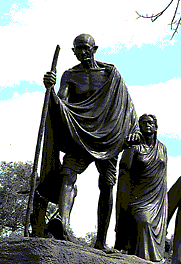|

|
Nehru Era
Indira Era
Vajpayee Era
Chronology
|

|
| |
 Rejoicing in August 1947, the man who had been in the forefront of the freedom struggle since 1919, the man who had given the message of non-violence and love and courage to the Indian people, the man who had represented the best in Indian culture and politics, was touring the hate-torn lands of Bengal and Bihar, trying to douse the communal fire and bring comfort to people who were paying through senseless slaughter the price of freedom. In reply to a message of birthday congratulations in 1947, Gandhiji said that he no longer wished to live long and that he would invoke the aid of the all-embracing Power to take me away from this “vale of tears” rather than make me a helpless witness of the butchery by man become savage, whether he dares to call himself a Muslim or a Hindu or what not. Rejoicing in August 1947, the man who had been in the forefront of the freedom struggle since 1919, the man who had given the message of non-violence and love and courage to the Indian people, the man who had represented the best in Indian culture and politics, was touring the hate-torn lands of Bengal and Bihar, trying to douse the communal fire and bring comfort to people who were paying through senseless slaughter the price of freedom. In reply to a message of birthday congratulations in 1947, Gandhiji said that he no longer wished to live long and that he would invoke the aid of the all-embracing Power to take me away from this “vale of tears” rather than make me a helpless witness of the butchery by man become savage, whether he dares to call himself a Muslim or a Hindu or what not.
The celebrations of independence had hardly died down when on 30th January 1948, a radical minded Hindu, Nathuram Godse, assassinated Gandhiji at Birla house, just before his evening prayers. The whole nation was shocked and stricken with grief and communal violence retreated from the minds of men and women. Expressing the nation’s sorrow, Nehru spoke over the All India Radio:
“Friends and comrades, the light has gone out of our lives and there is darkness everywhere . . . The light has gone out, I said, and yet I was wrong. For the light that shone in this country was no ordinary light . . . that light represented something more than the immediate present; it represented the living, the eternal truths, reminding us of the right path, drawing us from error, taking this ancient country to freedom.”
|




 Rejoicing in August 1947, the man who had been in the forefront of the freedom struggle since 1919, the man who had given the message of non-violence and love and courage to the Indian people, the man who had represented the best in Indian culture and politics, was touring the hate-torn lands of Bengal and Bihar, trying to douse the communal fire and bring comfort to people who were paying through senseless slaughter the price of freedom. In reply to a message of birthday congratulations in 1947, Gandhiji said that he no longer wished to live long and that he would invoke the aid of the all-embracing Power to take me away from this “vale of tears” rather than make me a helpless witness of the butchery by man become savage, whether he dares to call himself a Muslim or a Hindu or what not.
Rejoicing in August 1947, the man who had been in the forefront of the freedom struggle since 1919, the man who had given the message of non-violence and love and courage to the Indian people, the man who had represented the best in Indian culture and politics, was touring the hate-torn lands of Bengal and Bihar, trying to douse the communal fire and bring comfort to people who were paying through senseless slaughter the price of freedom. In reply to a message of birthday congratulations in 1947, Gandhiji said that he no longer wished to live long and that he would invoke the aid of the all-embracing Power to take me away from this “vale of tears” rather than make me a helpless witness of the butchery by man become savage, whether he dares to call himself a Muslim or a Hindu or what not.